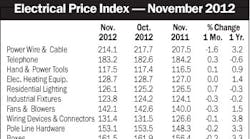Evan Gaddis took office as president of the National Electrical Manufacturers Association (NEMA), Rosslyn, Va., Sept. 19. He recently spent time on a telephone interview with Electrical Marketing to discuss his new role.
Gaddis, a former two-star Army general, came to NEMA after serving as president of the Gas Appliance Manufacturers Association (GAMA) for several years.
NEMA’s Board of Governors chose Gaddis this past summer after a nationwide search. At GAMA, Gaddis led a national trade association representing over 200 manufacturers of residential, commercial and industrial heating appliances, equipment and components, as well as manufacturers of equipment and providers of services used in the production, transmission, and distribution of fuel gases. During his distinguished Army career, he rose to commander of U.S. Army recruiting. He managed a $401 million organization with more than 12,000 employees and an annual objective of recruiting 122,000 new Army personnel.
He succeeds Malcolm O’Hagan, who was president of the association since 1991.
Q: Do you see any similarities between NEMA’s challenges and those of the Gas Appliance Manufacturers Association?
A: I do. First of all, we’re both in energy. The old association happened to be gas; this is electric. So we teamed with NEMA on the energy bill. We also teamed with NEMA on some of our international issues; looking at expansion in China and so on. International trade is also a huge issue for both associations. Another issue is federal preemption, where the states are trying to step into federal issues. It’s a concern, because manufacturers might have to worry about trying to sell a product in 50 states or 50 countries with different regulations.
Q: You have quite a background in the military. How has that experience prepared you for your new role at NEMA? A: Everybody has an idea that being a leader or a general in the military is different from being a CEO in the civilian sector and it really isn’t. Leadership is leadership. Management is management. The skills cross over on everything. The first thing I realize when I go out and meet with the board of directors, it’s just like sitting around talking to a bunch of generals. Same subjects — you talk efficiency, productivity and leadership. There are a few things different. Where I used to study (Carl Von) Clausewitz and Sun Tzu, they’ve probably studied Rockefeller and more recently, Jack Welch. Other than that, you could put a uniform on these CEOs and give them a few books and a little bit of training and they could be a general. There’s an awful lot of similarity.
In the military we are always concerned about saving lives. All of the member CEOs talk about safety in the workforce. In the military you try to keep people from getting hurt, while in the electroindustry you try to keep people from getting hurt from electricity. A lot of the principles are the same.
Q: What are the top three challenges you will be working on in the near-term?
A: Globalization and how it affects our industry has to be No. 1 not only in China but also all over Asia and Europe. We live in a high-speed, high-tech world. Organizations have to be nimble. They have to understand that the way we used to do business is changing.
Q: When you talk about this area of globalization, would you also be including the loss of manufacturing jobs from the United States? Would that be part of this?
A: That’s all part of globalization. You have to look back in history to see what has happened. A lot of companies are consolidating, because of what has happened in the stock market, because of the Internet boom and bust. CEOs were forced to move offshore to lower-cost areas. Initially, we were talking Mexico. Lately we’re talking Asia and China. It’s all because they’re being forced to look at the bottom line by their shareholders. It’s a world economy, not just a domestic economy.
Q: What are your first priorities at NEMA?
A: My priority is listening and understanding. I have to understand this industry. I’m new to it, so I’m visiting a lot of members. I’m listening to my staff and trying to learn about it. I vary the mix a little bit — right now I’m going to say it’s about a 3-to-1 mix: three parts listen and one part transmit. You have to know the industry and understand it before you can go out there and make credible decisions and, if warranted, changes. And then the next challenge — and I’m giving these in very broad terms — but it’s really preparing for the future. It’s understanding where the industry or where our members want to go. I want to be there when they arrive. That falls under a lot of different labels, but it’s leveling the playing field, it’s making sure that we understand where the industry is going and we take down the barriers to get there. So the bottom line is preparing for the future and making sure we reduce the burden on our members.
Q: How do you see NEMA preparing to meet that challenge?
A: NEMA has a very visionary and active board of directors, and they are the top people in the industry. You have some of the best minds and the best leaders in the industry. They have assets that they can put behind an issue when we identify it. Second, I would tell you that we have a very seasoned and professional staff at NEMA so when we identify something they can react to it fast. We can carry out the will of our membership.
Q: Technical standards, international trade issues, and lobbying efforts for issues that affect NEMA members have historically been the key areas of NEMA’s focus. Will that continue in the future? Are there any new areas that will be at the forefront of NEMA’s efforts in the near future?
A: The answer is codes and standards are going to remain our core. We will not take the focus away from that. You also mentioned advocacy. We’re very good at that and we are going to improve. One thing you did not mention is market analysis or market research. We have a very strong department NEMA/BIS (Business Information Services. And it’s a service that our people take advantage of, but many more people could. I should reiterate that we also need to focus our attention on understanding the forces of globalization, its impact on our industry, and move accordingly.
Q: IDEA, IDW and IDX2 seem to be gaining some momentum, industry acceptance still frustrates supporters. What will it take to get more NEMA members to buy in and take advantage of these tools?
A: I think IDEA is one of the most innovative and promising things that I have seen here. And another advantage there is top-level leadership. We have the new NEMA chairman coming in — Tim Powers, the president of Hubbell, an extremely visionary and capable person. He’s going to give us the leadership and what we need to carry IDEA forward. NEMA continues to make participation in IDEA, the Industry Data Warehouse, the Data Audit and Certification program and the Industry Data Exchange a top priority. Powers is the chairman of IDEA. Under his leadership, manufacturer and NEMA member participation has grown, especially in the IDW and DAC programs. I expect that to continue.
I will leave with you some interesting data. Of the 115 manufacturer companies that are attending the NAED Eastern event, 65 percent of the 115 are NEMA members, 70 percent of the 115 are providing their data to the IDW and 61 percent of the 115 are enrolled in the Data Audit Program. While the target is 100 percent participation, this is a great indication that manufacturers support IDEA and the IDW program. So we see IDEA growth and adoption continuing, not stabilizing or shrinking.

